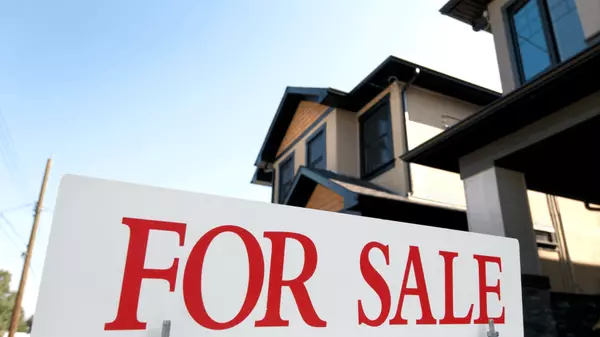How to Tell if an HOA Is Right For You (and What to Know Before You Join)
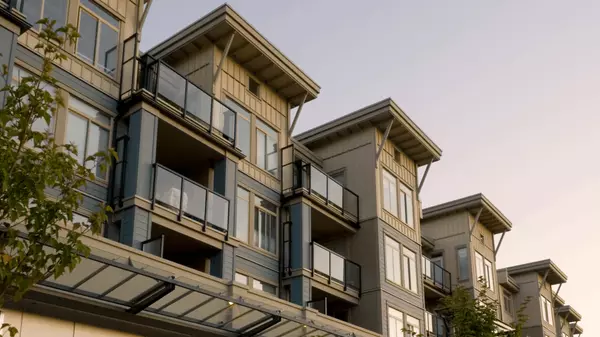
If you’re house hunting and condos or subdivisions are on your radar, you’ve probably scanned a listing and wondered aloud, “What is a homeowners association, exactly?” These governing boards are common in neighborhoods that started with one piece of land or one building that was then subdivided. They cover much of the maintenance and upkeep that’s usually expected of a homeowner, but that doesn’t mean they come without tradeoffs. There are positives, negatives, and lifestyle considerations to take into account before committing to living in an HOA community. Here are some to consider. What is an HOA? An HOA is a legal governing board, nearly always made up of residents, that oversees, manages, and maintains a community like a condo building or subdivision. They are in charge of using HOA funds for upkeep, maintenance, and services. Leo Peak, REALTOR®️ at Peak Family Real Estate Group, explains, “HOAs typically cover common area upkeep, exterior building and amenity maintenance, rule enforcement, and architectural guidelines. This involves maintaining shared spaces, managing amenities, enforcing aesthetic consistency and resolving disputes. HOAs also handle financial aspects, including collecting dues, budgeting for ongoing maintenance, and creating reserves for future needs.” Residents of HOA communities will pay monthly or annual dues that are used for these ongoing expenses, and they may be asked to contribute to special assessments for larger repairs. They can be involved in the HOA or take a backseat and let other residents volunteer to steer the board. “Active engagement, through events, meetings, committees or boards, provides opportunities for contributing to decision-making processes. Staying informed is also crucial for homeowners to be aware of important community updates,” adds Peak. What Are the Pros and Cons of an HOA Community? Like anything, there are pros and cons to living in an HOA community. Some people love living in an HOA and relying on someone else to manage maintenance and community issues, while others steer clear of an HOA because they want the freedom to make any decision they want regarding their home. Chelsea Werner, a global real estate advisor with Sotheby’s, says, “Some of the pros are that an HOA can provide a much easier lifestyle overall, and you don’t have to deal with the upkeep of your common spaces. You get the benefit of amenities like a pool and a gym. Plus, if something goes wrong within the building you are not solely responsible financially.” On the flip side, she notes that some people feel restricted by HOA rules, and decision-making can be difficult with an entire HOA board involved. Peak notes another key benefit. “HOAs can be especially helpful when there are disagreements between neighbors. Having a set of rules and regulations that all homeowners have agreed to provides an easy point of reference for handling any issues.” How Should a Buyer Approach Purchasing a Home with an HOA? If you’re considering buying a home with an HOA, it’s a good idea to review the HOA documents with an attorney. These include the CC&Rs (Covenants, Conditions, and Restrictions), bylaws, minutes, and financial statements. “Carefully read the CC&Rs and bylaws for information about the HOA’s rules and regulations, including any restrictions on what you can and cannot do to your property,” says Peak. He notes that you should check to see whether restrictions may apply to the common areas and shared amenities — especially if those are in contrast to how you plan on using the space. Because the HOA is in charge of major maintenance, you need to make sure it has adequate reserves in place. Peak explains, “Review the HOA’s financial statements to ensure it is financially stable and has enough money in reserves to cover any repairs or maintenance that may be needed.” If the money isn’t there, you could get stuck with an assessment for a special project, like replacing a roof or repaving roads. Other things to note within the HOA bylaws include whether you can rent out your home, whether you can install certain types of appliances, and, if you have outdoor space, how that needs to be maintained. How Do HOA Dues Work? HOA dues are decided upon by the governing board, so they can range from under $50 a year to thousands of dollars a month. This amount often depends on what’s expected of the HOA, what’s included in the community, and whether the HOA is currently raising money for capital improvements. A condo building with a pool, common spaces, mail service, and a front doorman will have significantly higher dues than a subdivision where the HOA exists to enforce house colors and cover landscaping at the entrance to the neighborhood only. HOA dues can increase when the board votes in support of an increase. They will determine the right amount to cover any upcoming costs and bulk up the community’s reserves. What Happens If HOA Rules Are Broken? Everyone has heard the HOA horror stories. A house gets painted an offensive color and immediately receives an HOA letter. Someone installs a shed, and a warning from the HOA arrives. But HOAs don’t have to be all bad. “I always tell people to look at it as if they are all shareholders within the same company — you all have a common goal and vested financial and personal interest. It is important to come from that mindset rather than a combative one,” says Werner. She explains that the HOA is required to have protocols in place for what happens if and when a rule is broken. “These offenses can be minor and lead to a fine or, on a larger scale, lead to eviction.” But she recommends trying to work with the HOA rather than forging forward and breaking rules. Werner explains, “If you have an issue, try and figure out how to appeal to the invested interest of everyone and not just yourself. For example, if you want to do a large construction project but are getting pushback from the association, it may be helpful to show how your work will increase the resale value for your home and thus for similar lines down the road in the building.” --- Original article posted in Apartment Therapy
Read MoreWant to Buy a Home in 2025? 11 Things to Do Now

Want To Buy a Home in 2025? 11 Things You Need To Do Now By Angela Mae skynesher / Getty Images If you’re buying a home in the next year or so, there are many things you should start doing to prepare for the process. After all, homeownership is exciting but the process itself can be lengthy and complicated. The more prepared you are, the smoother — and potentially quicker — the process will be. From checking your credit and researching financing options to getting preapproved for a loan and finding the right lender, here are the top things you should do right now if you want to buy a home in the coming year. Familiarize Yourself With the Terminology If you’re not buying a home right away, you have some time to become familiar with the terminology. Many of these terms — like APR, interest rates, or prepayment penalties — can be confusing. By learning what these terms mean now, as well as how they might affect you, you can clear up any confusion early on. Take your time to learn the difference between APRs and interest rates. Research the different loan terms and the advantages and disadvantages of each. Consider spending an hour or so a week learning about these things until you’ve got a clear understanding of them. Check with sites like the Consumer Financial Protection Bureau (CFPB) for more information about the homebuying process and the commonly used terms. Build Your Credit Score Having good credit is key to getting the financing you need. The better your credit score is, the better your approval odds will be. Plus, good credit can typically get you better rates and terms — all good things for your future self. But if you don’t have good credit, now’s a good time to start improving it. Make sure you pay your debts on time. Avoid applying for multiple new lines of credit or loans, especially if you plan to apply for a mortgage loan in the next year. Pay down any existing debts to reduce your credit utilization — that is, how much of your available credit you’re currently using.You should also check your credit report to see which areas need the most work — and which are in good standing. “Obtain a copy of your credit report and assess your credit score–a higher credit score results in better mortgage rates,” said Leo Peak, a realtor with Peak Family Real Estate Group. “If improvements are needed, take proactive steps to address any issues.” You can get a free copy of your credit report at Annual Credit Report. Lower Your Debt-to-Income Ratio Your debt-to-income ratio, or DTI, is a percentage based on your debt obligations and income. You can calculate this by adding up your monthly debts — like your credit card payments and auto loans — and dividing that number by your gross monthly income. Say, for example, you spend $1,500 a month on all monthly debts and earn $4,000 a month before taxes. Your DTI would be 37%. The higher your DTI, the less likely a lender is going to want to lend you money. The reason for this is quite simple: The more of your money that’s tied to your other obligations, the less confidence a lender will have in you being able to pay back a new loan. If your DTI is currently on the higher side, take this time to start paying off what you owe. Alternatively, you can increase your income as this will also lower your DTI. “My advice would be to prioritize reducing debt obligations. It’s a common misconception among homebuyers that credit scores and income are the sole factors affecting their purchasing power. In reality, the debt-to-income ratio plays a substantial role in determining how much home one can afford,” said Michael J. Vestuto, real estate professional at Vestuto Realty Group — Platinum Real Estate Professionals. Save Up For a Larger Down Payment Different types of home loans have different requirements, but you’ll typically need to have some money for a down payment when applying for financing. The more you have saved up, the better your chances of getting the loan you need. A larger down payment might also help you get a lower interest rate. And if you want to buy a more expensive home, paying more money upfront can increase your ability to do so. “Building up a larger savings for your down payment will give you flexibility in how much you can buy, and may give you a cushion for unplanned expenses,” said Jay Zigmont, Ph.D., CFP®, Founder of Childfree Wealth. If you’re getting a conventional home loan, you’ll also need a minimum down payment of 20% to avoid private mortgage insurance (PMI). This is an additional monthly or upfront expense — sometimes both — that’s designed to benefit the lender. Research Different Loan Options and Terms There are many types of home loans and repayment terms available, so do your research to see which works best for you. Common mortgage loan types include VA loans, USDA loans, FHA loans, conventional loans, and jumbo loans. Each loan type has its own eligibility requirements. For example, USDA and VA loans generally do not have a minimum down payment requirement. However, you’ll need to meet additional requirements to qualify. Conventional loans, meanwhile, often come with a low down payment requirement but cap out at $726,200 in many counties. While reviewing your options, consider the repayment terms as well. The most common terms are for 15 or 30 years. This means you’ll pay back the loan over that period — unless you make additional payments and can pay it off early. You might find shorter terms as well. Compare APR and Interest Rates Each lender will set its annual percentage rates (APRs) and interest rates. The interest rate is a percentage of the loan. It’s essentially the cost of borrowing money from a lender. The APR includes the interest rate plus any additional fees. Generally, the higher the rate, the more money you’ll be paying back in interest over the life of the loan. You can usually get a lower rate if you have a larger down payment, good credit, and a low DTI. Another thing to keep in mind is that mortgage loans may come with either a fixed or adjustable rate. The interest rate on a fixed-rate loan never changes. An adjustable rate may fluctuate over time. The interest rate type can affect your monthly payment and whether or not it changes. Set a Realistic Homebuying Budget You should also set a clear homebuying budget based on your current and anticipated financial situation, as well as your future goals and needs. “Next, focus on budget planning. Assessing how much house you can afford is more than calculating potential mortgage payments,” said Daniel Smith, CEO and Founder of Keepingly. “Buyers must account for additional expenses such as property taxes, insurance, maintenance costs, and any homeowners association fees that might apply. Comprehensive budgeting will give a realistic picture of what buyers can afford without stretching finances too thin.” Consider Getting Preapproved Preapproval gives you a clearer picture of what you might qualify for and at what rates. This can help you identify any weak points in your application that you can then fix. Getting pre-approved isn’t a guarantee that you’ll get a loan. But it can show sellers that you’re serious about purchasing a home. If you’re not worried about weaknesses in your application, you might want to wait to get preapproved until you’re closer to buying a home. That’s because any preapproval letter you get will typically expire after a few months. If you do it too early, you’ll need to repeat the process later. Consider State Programs Certain state programs are out there to make buying a home easier and more affordable. This includes down payment assistance and closing cost assistance programs. Many of these are geared toward low-income households or first-time buyers, but it doesn’t hurt to see what’s available. Factor In Extra Costs A down payment is only one expense in the homebuying process. You might also have to pay closing costs before you can finalize the transaction. Other costs to consider include moving costs, minor maintenance or repairs, and new furniture or home decor. You’ll also generally need to purchase homeowners insurance. Start preparing for these things now by setting aside a little extra money in your homebuying fund each month. That way, you’ll be ready to get a home when the time comes. Find a Real Estate Agent or Broker Having a real estate agent or broker at your side can make the process so much easier, so start researching your options now. “Future home buyers will want to connect with a mortgage broker who can advise them on documents they will want to prepare,” said Marisa Simonetti, real estate professional with Simonetti Real Estate Team. “Home buyers don’t want to wait until the last second to have their dream home slip away from them.” --- Original article published in GoBankingRates.com
Read MoreWill using neutral tones when staging a home die out?
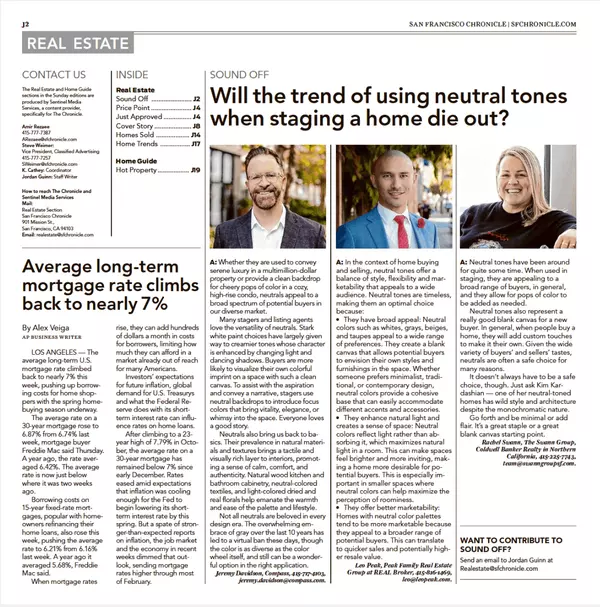
In the context of home buying and selling, neutral tones offer a balance of style, flexibility and marketability that appeals to a wide audience. Neutral tones are timeless, making them an optimal choice because: It has broad appeal: Neutral colors such as whites, grays, beiges, and taupes appeal to a wide range of preferences. They create a blank canvas that allows potential buyers to envision their own styles and furnishings in the space. Whether someone prefers minimalist, traditional, or contemporary design, neutral colors provide a cohesive base that can easily accommodate different accents and accessories. It enhances natural light and creates a sense of space: Neutral colors reflect light rather than absorbing it, which maximizes natural light in a room. This can make spaces feel brighter and more inviting, making a home more desirable for potential buyers. This is especially important in smaller spaces where neutral colors can help maximize the perception of roominess. It offers better marketability: Homes with neutral color palettes tend to be more marketable because they appeal to a broader range of potential buyers. This can translate to quicker sales and potentially higher resale value. Original article published in the San Francisco Chronicle on March 24, 2024.
Read MoreHow is the homeowner's insurance crisis affecting the San Francisco real estate market?
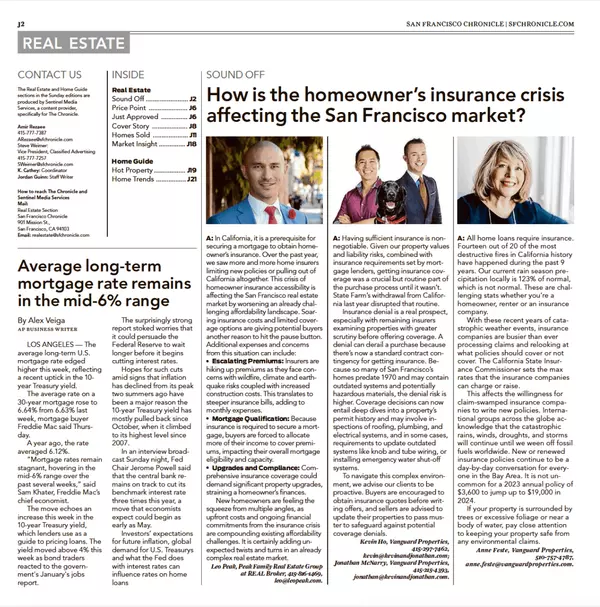
A: In California, it is a prerequisite for securing a mortgage to obtain homeowner’s insurance. Over the past year, we saw more and more home insurers limiting new policies or pulling out of California altogether. This crisis of homeowner insurance accessibility is affecting the San Francisco real estate market by worsening an already challenging affordability landscape. Soaring insurance costs and limited coverage options are giving potential buyers another reason to hit the pause button. Additional expenses and concerns from this situation can include: • ESCALATING PREMIUMS: Insurers are hiking up premiums as they face concerns with wildfire, climate and earthquake risks coupled with increased construction costs. This translates to steeper insurance bills, adding to monthly expenses. • MORTGAGE QUALIFICATION: Because insurance is required to secure a mortgage, buyers are forced to allocate more of their income to cover premiums, impacting their overall mortgage eligibility and capacity. • UPGRADES AND COMPLIANCE: Comprehensive insurance coverage could demand significant property upgrades, straining a homeowner’s finances. New homeowners are feeling the squeeze from multiple angles, as upfront costs and ongoing financial commitments from the insurance crisis are compounding existing affordability challenges. It is certainly adding unexpected twists and turns in an already complex real estate market. Original article published in the San Francisco Chronicle on February 11, 2024
Read More-
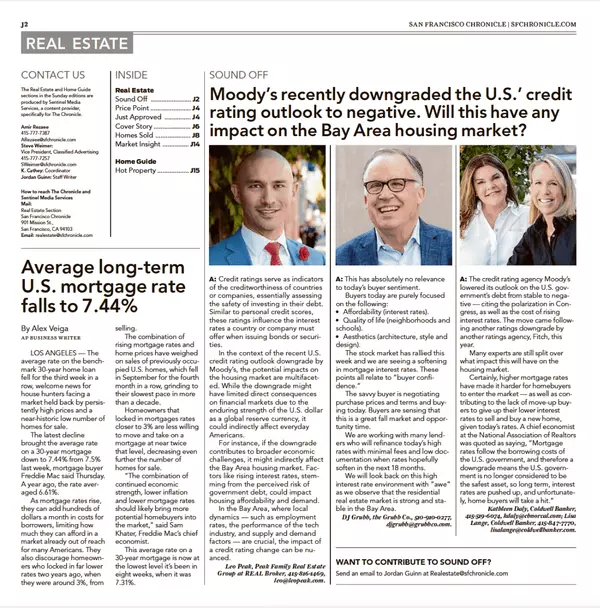
A: Credit ratings serve as indicators of the creditworthiness of countries or companies, essentially assessing the safety of investing in their debt. Similar to personal credit scores, these ratings influence the interest rates a country or company must offer when issuing bonds or securities. In the context of the recent U.S. credit rating outlook downgrade by Moody’s, the potential impacts on the housing market are multifaceted. While the downgrade might have limited direct consequences on financial markets due to the enduring strength of the U.S. dollar as a global reserve currency, it could indirectly affect everyday Americans. For instance, if the downgrade contributes to broader economic challenges, it might indirectly affect the Bay Area housing market. Factors like rising interest rates, stemming from the perceived risk of government debt, could impact housing affordability and demand. In the Bay Area, where local dynamics — such as employment rates, the performance of the tech industry, and supply and demand factors — are crucial, the impact of a credit rating change can be nuanced. --- Original article published in the San Francisco Chronicle on November 19, 2023.
Read More Understanding the CA Real Estate Purchase Agreement

Buying a house can be a big deal, and not just because of the complexities of the home buying process. There’s also a big legal component to consider when entering a real estate transaction, particularly when signing a purchase agreement. This article will explain what a purchase agreement means in a real estate transaction, and help you to understand how it’s prepared and what components make it up. What Is A Real Estate Purchase Agreement? In real estate, a purchase agreement is a binding contract between a buyer and seller that outlines the details of a home sale transaction. The buyer will propose the conditions of the contract, including their offer price, which the seller will then either agree to, reject or negotiate. Negotiations may go back and forth between the buyer and the seller before both parties are satisfied. Once both parties approve the terms and have signed the purchase agreement, they're considered to be "under contract" or "ratified." Who Prepares The Real Estate Purchase Agreement? Typically, the buyer's agent writes up the purchase agreement. However, unless they are legally licensed to practice law, real estate agents generally can't create their own legal contracts. Instead, firms will often use standardized form contracts that allow agents to fill in the blanks with the specifics of the sale. What’s Included In A House Purchase Agreement? Every real estate transaction is different, so not all real estate purchase agreements will look the same. However, there are some basic items that should be included in every purchase agreement. Buyer and seller information Property details Pricing and financing Fixtures and appliances included/excluded in the sale Closing and possession dates Earnest money deposit amount Closing costs and who is responsible for paying Conditions under which the contract can be terminated Contingencies or conditions that must be met for the sale to go through Understanding The Components Of A Real Estate Purchase Contract While many parts of your contract are fairly straightforward, like what price you'll pay and when closing will happen, other parts of the purchase agreement might be a little confusing, especially for first-time home buyers. Make sure you fully understand the entire purchase agreement before you sign it. Financing Your real estate contract will include information about how the home will be paid for. If the buyer isn't paying in cash, they'll need some sort of financing (like a mortgage loan) to buy the home, the specifics of which will be written out in the contract. For example, the contract will specify if the buyer is obtaining a mortgage to purchase the property, or if they're using an alternative, such as assuming the current mortgage on the property. Another option is seller financing, where the buyer makes payments to the seller rather than a traditional mortgage lender. Earnest Money Deposit Earnest money, sometimes also referred to as a good faith deposit, shows that a buyer is serious about buying the home. Sellers don't want to waste their time; they want to know that a buyer is going to stick with the contract through closing. The earnest money deposit gives them that confidence. If, between the time you sign the purchase agreement and close on the home, the buyer decides they want to back out for a reason that isn't stipulated in the contract, they lose their earnest money, and the seller gets to pocket it. However, a buyer can get their earnest money back if they back out due to a reason stipulated in the contract. Earnest money is typically held in escrow by a third party and is credited toward the down payment or closing costs at closing. Contingencies There are many different types of contingencies that can be included in real estate contracts on both the buyer's and seller's side, and it's important to understand any contingencies that are included in your purchase agreement. Contingencies are conditions that must be met before the sale can go through. Here are some of the more common contingencies you may see in home sale contracts: Financing contingency: The sale is contingent on the buyer being able to obtain financing. This protects the buyer in the case they are unable to secure a mortgage. Inspection contingency: The buyer is able to back out of the sale without penalty if they aren't satisfied with a professional inspector's assessment of the home. Appraisal contingency: This contingency states that the home must appraise at a value equal to or higher than what the buyer agreed to pay. Home sale contingency: The home purchase is contingent on the buyer's ability to sell their current home. Closing Costs At closing, there are certain fees and costs that will need to be paid. How much each party will pay will depend on what was negotiated in the contract. Closing costs can include things like the real estate agent's commission, appraisal and inspection fees, taxes, lenders fees and insurance. For buyers, closing costs may be 3 – 6% of the purchase price. Closing costs may be slightly higher for sellers. Can A Real Estate Purchase Agreement Be Cancelled? The best time to back out of a real estate purchase is before you’ve signed the purchase agreement. After that, you’re under contract, and you may be penalized if you back out for reasons that aren’t stipulated in the purchase agreement. Before signing a purchase agreement, make sure it includes information about the conditions under which the contract can be terminated. FAQS About Real Estate Purchase Agreements How do you write a real estate purchase agreement? The purchase contract is typically prepared and written out by a real estate agent, not a buyer or a seller. As discussed above, a purchase agreement should contain buyer and seller information, a legal description of the property, closing dates, earnest money deposit amounts, contingencies and other important information for the sale. How legally binding is a purchase agreement? A purchase contract is as legally binding as is stated in the agreement itself. A purchase agreement should stipulate acceptable reasons for a buyer backing out of a purchase. Otherwise, once it’s signed, you stand to lose your earnest money deposit should you break your contract. A seller can back out of a contract for several reasons, such as complications that arise from contingencies in the purchase agreement. Do purchase agreements expire? Yes, and any expiration date should be clearly outlined in the purchase agreement. The Bottom Line Even if you aren't a legal expert, it's still important to understand the legal and contractual aspects of your home sale or purchase. Buying or selling a home is a big deal, and you can avoid headaches by making sure the deal you're getting into is a good one. Originally published on Quickenloans.com
Read MoreNationwide, younger buyers need help from relatives to buy a home; is this common in the Bay Area?
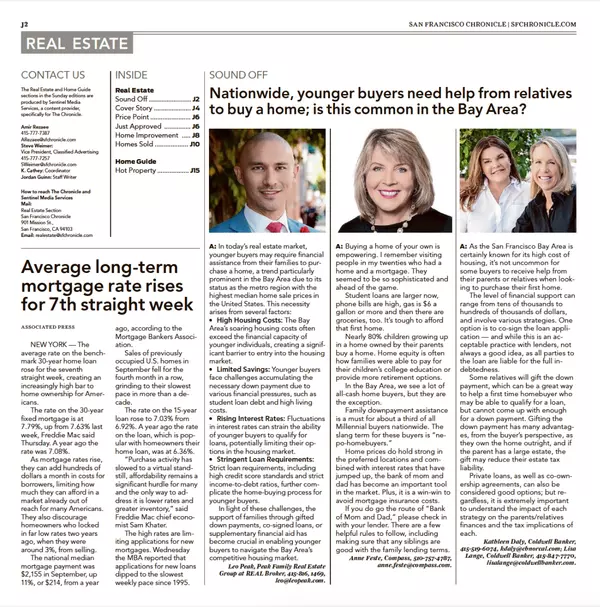
A: In today’s real estate market, younger buyers may require financial assistance from their families to purchase a home, a trend particularly prominent in the Bay Area due to its status as the metro region with the highest median home sale prices in the United States. This necessity arises from several factors: • High Housing Costs: The Bay Area’s soaring housing costs often exceed the financial capacity of younger individuals, creating a significant barrier to entry into the housing market. • Limited Savings: Younger buyers face challenges accumulating the necessary down payment due to various financial pressures, such as student loan debt and high living costs. • Rising Interest Rates: Fluctuations in interest rates can strain the ability of younger buyers to qualify for loans, potentially limiting their options in the housing market. • Stringent Loan Requirements: Strict loan requirements, including high credit score standards and strict income-to-debt ratios, further complicate the home-buying process for younger buyers. In light of these challenges, the support of families through gifted down payments, co-signed loans, or supplementary financial aid has become crucial in enabling younger buyers to navigate the Bay Area’s competitive housing market. --- Original article published in the San Francisco Chronicle on October 29, 2023.
Read MoreFAQ: How is inflation affecting the Bay Area real estate market?
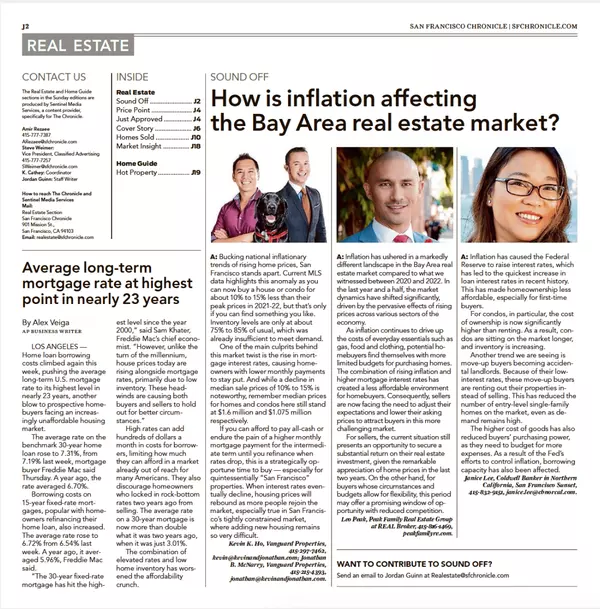
A: Inflation has ushered in a markedly different landscape in the Bay Area real estate market compared to what we witnessed between 2020 and 2022. In the last year and a half, the market dynamics have shifted significantly, driven by the pervasive effects of rising prices across various sectors of the economy. As inflation continues to drive up the costs of everyday essentials such as gas, food and clothing, potential homebuyers find themselves with more limited budgets for purchasing homes. The combination of rising inflation and higher mortgage interest rates has created a less affordable environment for homebuyers. Consequently, sellers are now facing the need to adjust their expectations and lower their asking prices to attract buyers in this more challenging market. For sellers, the current situation still presents an opportunity to secure a substantial return on their real estate investment, given the remarkable appreciation of home prices in the last two years. On the other hand, for buyers whose circumstances and budgets allow for flexibility, this period may offer a promising window of opportunity with reduced competition. --- Original article published in the San Francisco Chronicle on October 1, 2023.
Read MoreWhat holidays are most beneficial when it comes to home sales?
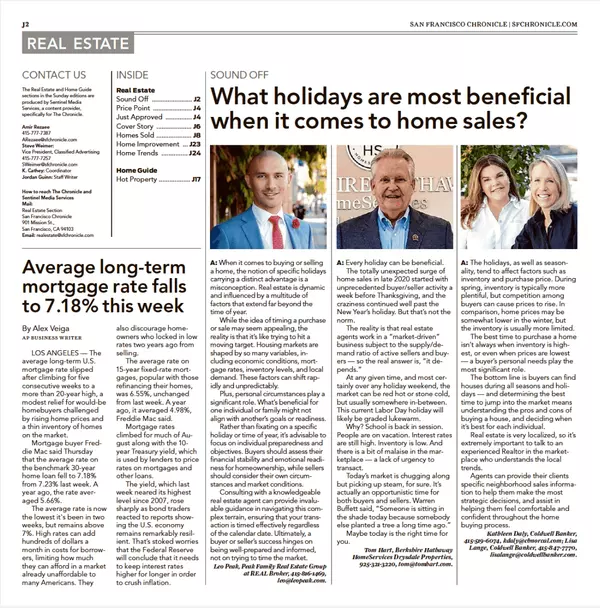
A: When it comes to buying or selling a home, the notion of specific holidays carrying a distinct advantage is a misconception. Real estate is dynamic and influenced by a multitude of factors that extend far beyond the time of year. While the idea of timing a purchase or sale may seem appealing, the reality is that it’s like trying to hit a moving target. Housing markets are shaped by so many variables, including economic conditions, mortgage rates, inventory levels, and local demand. These factors can shift rapidly and unpredictably. Plus, personal circumstances play a significant role. What’s beneficial for one individual or family might not align with another’s goals or readiness. Rather than fixating on a specific holiday or time of year, it’s advisable to focus on individual preparedness and objectives. Buyers should assess their financial stability and emotional readiness for homeownership, while sellers should consider their own circumstances and market conditions. Consulting with a knowledgeable real estate agent can provide invaluable guidance in navigating this complex terrain, ensuring that your transaction is timed effectively regardless of the calendar date. Ultimately, a buyer or seller’s success hinges on being well-prepared and informed, not on trying to time the market. --- Original article published in the San Francisco Chronicle on September 3, 2023.
Read MoreHow might the Airbnb market crash affect homeownership in the Bay Area?

A: A potential crash of the Airbnb market in the Bay Area is unlikely to have a significant impact on homeownership, due to the existing severely low inventory levels in the market. This was evidenced in 2020, when there was a sudden decline in short-term rental (STR) occupancy rates without causing disruption to the broader housing market. Depending on the financial circumstances and decisions made by individual homeowners, some may opt to hold onto their properties, anticipating a recovery in the Airbnb market, while others may choose to sell due to financial pressures or shifts in their investment strategies. While this could offer more opportunities for buyers, even an influx of inventory from those offloading their STRs won’t make a huge dent. Currently, there are approximately 1.4 million STR listings in the United States, while there are only around 600,000 active listings for sale. HousingWire’s lead analyst, Logan Mohtashami, explains that in a normal period, there would typically be between 2 to 2.5 million active listings. Even if all those homes were suddenly listed overnight, it would require an extended period before the additional inventory could bring levels back to normal. --- Article originally published in the San Francisco Chronicle on July 16, 2023.
Read MoreThe median age is rising in the Bay Area; what does this mean for home ownership?
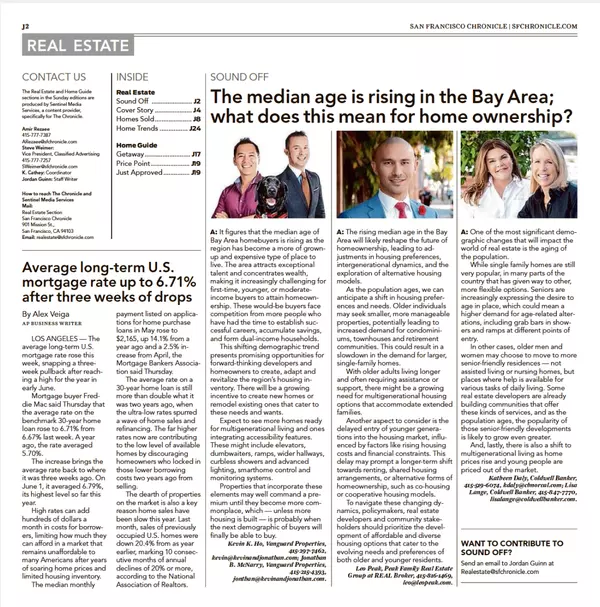
A: The rising median age in the Bay Area will likely reshape the future of homeownership, leading to adjustments in housing preferences, intergenerational dynamics, and the exploration of alternative housing models. As the population ages, we can anticipate a shift in housing preferences and needs. Older individuals may seek smaller, more manageable properties, potentially leading to increased demand for condominiums, townhouses and retirement communities. This could result in a slowdown in the demand for larger, single-family homes. With older adults living longer and often requiring assistance or support, there might be a growing need for multigenerational housing options that accommodate extended families. Another aspect to consider is the delayed entry of younger generations into the housing market, influenced by factors like rising housing costs and financial constraints. This delay may prompt a longer-term shift towards renting, shared housing arrangements, or alternative forms of homeownership, such as co-housing or cooperative housing models. To navigate these changing dynamics, policymakers, real estate developers and community stakeholders should prioritize the development of affordable and diverse housing options that cater to the evolving needs and preferences of both older and younger residents. --- Original article published in the San Francisco Chronicle on July 30, 2023.
Read MoreHow can high-rise and condo residents find out about the structural integrity of their buildings?
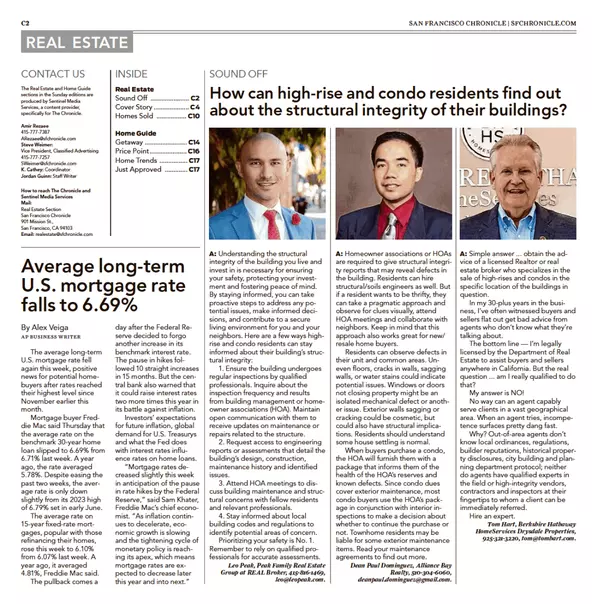
A: Understanding the structural integrity of the building you live and invest in is necessary for ensuring your safety, protecting your investment and fostering peace of mind. By staying informed, you can take proactive steps to address any potential issues, make informed decisions, and contribute to a secure living environment for you and your neighbors. Here are a few ways high-rise and condo residents can stay informed about their building’s structural integrity: 1. Ensure the building undergoes regular inspections by qualified professionals. Inquire about the inspection frequency and results from building management or homeowner associations (HOA). Maintain open communication with them to receive updates on maintenance or repairs related to the structure. 2. Request access to engineering reports or assessments that detail the building’s design, construction, maintenance history and identified issues. 3. Attend HOA meetings to discuss building maintenance and structural concerns with fellow residents and relevant professionals. 4. Stay informed about local building codes and regulations to identify potential areas of concern. Prioritizing your safety is No. 1. Remember to rely on qualified professionals for accurate assessments. --- Original article published in the San Francisco Chronicle on June 18, 2023.
Read MoreWhat is the crisis facing San Francisco’s building inspection department?
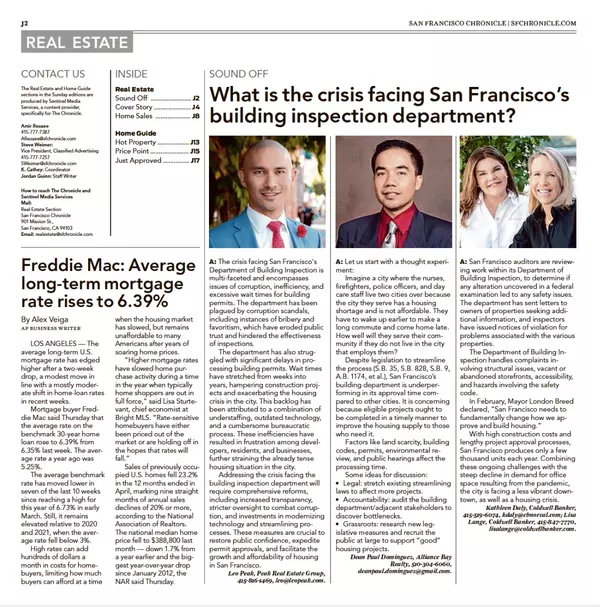
A: The crisis facing San Francisco's Department of Building Inspection is multi-faceted and encompasses issues of corruption, inefficiency, and excessive wait times for building permits. The department has been plagued by corruption scandals, including instances of bribery and favoritism, which have eroded public trust and hindered the effectiveness of inspections. The department has also struggled with significant delays in processing building permits. Wait times have stretched from weeks into years, hampering construction projects and exacerbating the housing crisis in the city. This backlog has been attributed to a combination of understaffing, outdated technology, and a cumbersome bureaucratic process. These inefficiencies have resulted in frustration among developers, residents, and businesses, further straining the already tense housing situation in the city. Addressing the crisis facing the building inspection department will require comprehensive reforms, including increased transparency, stricter oversight to combat corruption, and investments in modernizing technology and streamlining processes. These measures are crucial to restore public confidence, expedite permit approvals, and facilitate the growth and affordability of housing in San Francisco. --- Original article published in the San Francisco Chronicle on May 21, 2023.
Read MoreFAQ: What are the pros and cons of a proposed 55-story highrise in the Outer Sunset?
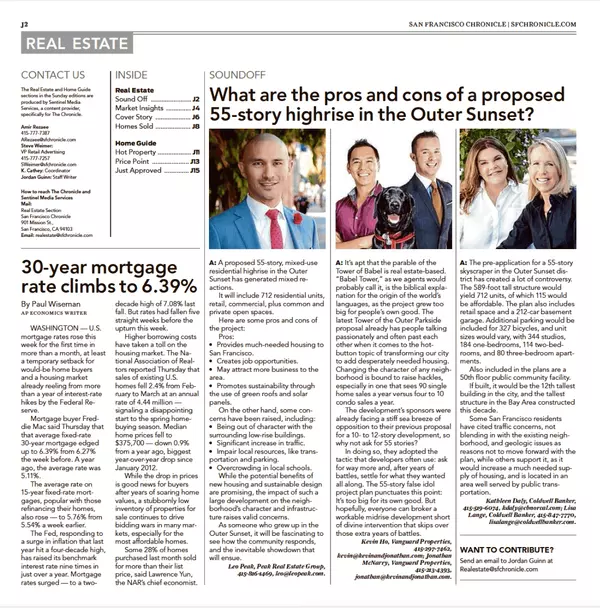
A: A proposed 55-story, mixed-use residential highrise in the Outer Sunset has generated mixed reactions. It will include 712 residential units, retail, commercial, plus common and private open spaces. Here are some pros and cons of the project: Pros: • Provides much-needed housing to San Francisco. • Creates job opportunities. • May attract more business to the area. • Promotes sustainability through the use of green roofs and solar panels. On the other hand, some concerns have been raised, including: • Being out of character with the surrounding low-rise buildings. • Significant increase in traffic. • Impair local resources, like transportation and parking. • Overcrowding in local schools. While the potential benefits of new housing and sustainable design are promising, the impact of such a large development on the neighborhood’s character and infrastructure raises valid concerns. As someone who grew up in the Outer Sunset, it will be fascinating to see how the community responds, and the inevitable showdown that will ensue. --- Original article published in the San Francisco Chronicle on April 23, 2023.
Read MoreFAQ: What are your thoughts on the proposal to revitalize several piers along the Embarcadero?

A: The current proposal to rebuild Pier 30 and 32 along the Embarcadero is slated to include an outdoor swimming pool, kayak launch, office space, retail, recreational facilities and maritime uses. Additionally, the adjacent former parking lot at 330 Seawall would be the site for 714 new residential units. Revitalizing the piers along the Embarcadero is an excellent opportunity to boost the local economy, create new job opportunities, attract more businesses to the area, and add more housing that the City desperately needs. By creating new and exciting public spaces, the City will attract more visitors, new potential residents, and will improve the lackluster landscape between two long-standing attractions, the Ferry Building and Oracle Park. Overall, this proposal has the potential to create numerous benefits for San Francisco, making it an even more vibrant and desirable place to visit and live. --- Original article posted in the San Francisco Chronicle on April 9, 2023.
Read MoreFAQ: Do you expect a crash in the Airbnb market?

A: Data from AirDNA, a short-term rental (STR) analytics firm, has indicated demand growth of 19.8% year-over-year. Despite this increase in bookings, the number of STR listings on the market has increased sharply, leading to lower occupancy rates. Many properties are now facing vacancy and financial losses due to the lack of rental income. Will we see a sudden influx of STR homes back on the market? We’ll more likely see a pivot into long-term rentals. Here’s why: • Locked in rates: Many of these homes were purchased with historically low interest rates. The rent could cover all the homeowner’s expenses. • Housing supply is still low: The current demand for housing still outpaces home building, which means a large pool of potential renters. • Inflation: Homebuyers have been priced out, increasing rental demand and forcing higher rents. Also, investment properties have historically proven to be an excellent hedge against inflation. Original article published in the San Francisco Chronicle on January 29, 2023.
Read MoreFAQ: Does the daylight savings time change affect real estate showings or sales?
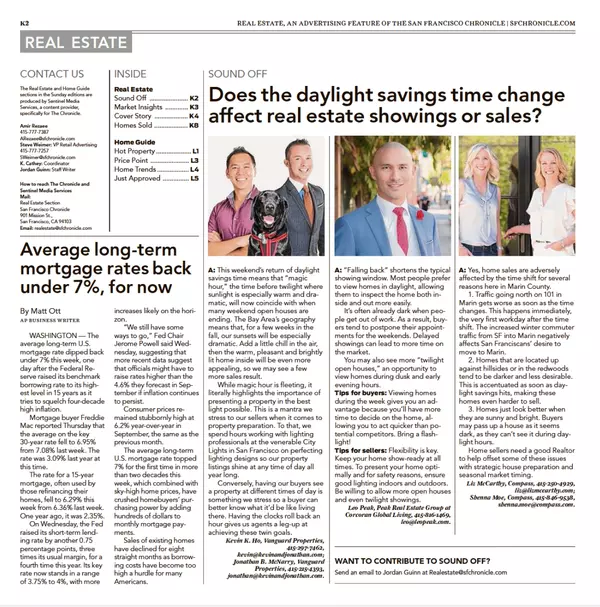
A: “Falling back” shortens the typical showing window. Most people prefer to view homes in daylight, allowing them to inspect the home both inside and out more easily. It’s often already dark when people get out of work. As a result, buyers tend to postpone their appointments for the weekends. Delayed showings can lead to more time on the market. You may also see more “twilight open houses,” an opportunity to view homes during dusk and early evening hours. TIPS FOR BUYERS: Viewing homes during the week gives you an advantage because you’ll have more time to decide on the home, allowing you to act quicker than potential competitors. Bring a flashlight! TIPS FOR SELLERS: Flexibility is key. Keep your home show-ready at all times. To present your home optimally and for safety reasons, ensure good lighting indoors and outdoors. Be willing to allow more open houses and even twilight showings. Original article was published in the San Francisco Chronicle on November 6, 2022.
Read MoreFAQ: How do you help people with disabilities and mobility issues find housing?
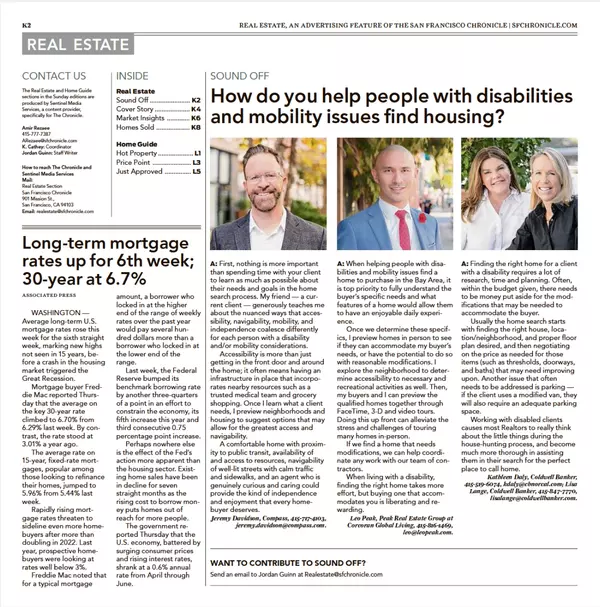
A: When helping people with disabilities and mobility issues find a home to purchase in the Bay Area, it is top priority to fully understand the buyer’s specific needs and what features of a home would allow them to have an enjoyable daily experience. Once we determine these specifics, I preview homes in person to see if they can accommodate my buyer’s needs, or have the potential to do so with reasonable modifications. I explore the neighborhood to determine accessibility to necessary and recreational activities as well. Then, my buyers and I can preview the qualified homes together through FaceTime, 3-D and video tours. Doing this up front can alleviate the stress and challenges of touring many homes in-person. If we find a home that needs modifications, we can help coordinate any work with our team of contractors. When living with a disability, finding the right home takes more effort, but buying one that accommodates you is liberating and rewarding. Original article was published in the San Francisco Chronicle on October 2, 2022.
Read MoreFAQ: When is it a Good Idea to Waive Contingencies and When is it Not?
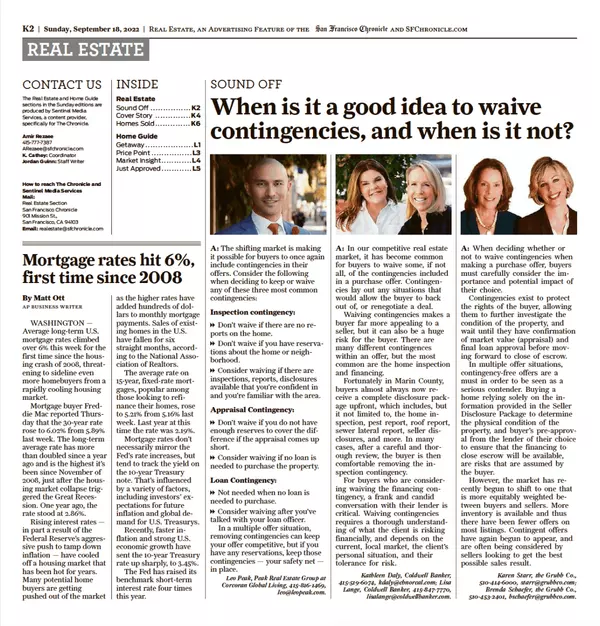
A: The shifting market is making it possible for buyers to once again include contingencies in their offers. Consider the following when deciding to keep or waive any of these three most common contingencies: Inspection contingency: » Don’t waive if there are no reports on the home. » Don’t waive if you have reservations about the home or neighborhood. » Consider waiving if there are inspections, reports, disclosures available that you’re confident in and you’re familiar with the area. Appraisal Contingency: » Don’t waive if you do not have enough reserves to cover the difference if the appraisal comes up short. » Consider waiving if no loan is needed to purchase the property. Loan Contingency: » Not needed when no loan is needed to purchase. » Consider waiving after you’ve talked with your loan officer. In a multiple offer situation, removing contingencies can keep your offer competitive, but if you have any reservations, keep those contingencies — your safety net — in place. The original article was posted in the San Francisco Chronicle on September 18, 2022.
Read MoreFAQ: Do You Recommend Homebuyers Invest in a Home Warranty?

A: Deciding to invest in a home warranty will depend on several factors, including the home’s age, how much work you’re willing to do yourself, and whether you have reserves for unexpected repairs. A home warranty may be a good idea if inspections show your appliances or home systems may be near the end of their lifespan, if you’re not a DIY-er, or don’t have a handyman on speed-dial. Also, if you don’t have a reserve fund set up, a home warranty could help. You may not need a home warranty if you’re already experienced with home improvements, or if you’re buying new construction (most builders provide a warranty covering workmanship and materials). Home warranties vary wildly in their coverage, terms and limitations, so if you do consider purchasing a warranty to protect your home investment and for peace of mind, always read the fine print. » Insider tip: If you’re a seller, offering a home warranty can give you an edge over the competition in today’s market. Original article published in the San Francisco Chronicle on August 21, 2022.
Read More
Recent Posts





